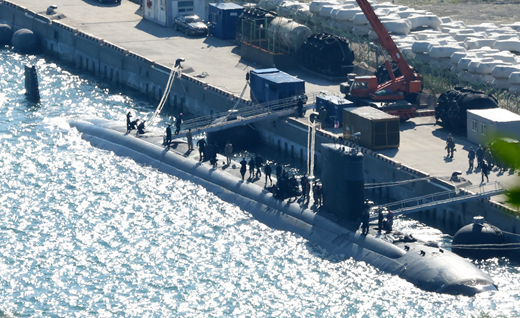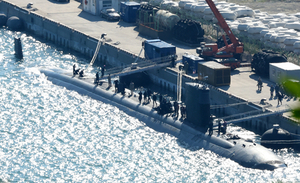 The USS Columbia (SSN 771), a 6,900-ton Los Angeles-class nuclear-powered submarine of the US Navy. (Newsis)
The USS Columbia (SSN 771), a 6,900-ton Los Angeles-class nuclear-powered submarine of the US Navy. (Newsis) ‘China views Seoul’s nuclear-powered sub project as security burden’
South Korea’s decision to pursue nuclear-powered submarines under a recent agreement with the United States is emerging as a watershed moment for the alliance, expanding its strategic cooperation into maritime and high-technology domains while potentially reshaping Northeast Asia’s security landscape, a think tank said Tuesday.
In a report released Tuesday, the Sejong Institute said that Seoul’s nuclear submarine program “marks not merely a step in defense capability, but a historic turning point that broadens the strategic horizon of the US-South Korea alliance to encompass maritime and critical technology cooperation.”
The report said the move symbolizes “a qualitative transformation” in the seven-decade alliance and will likely reverberate across inter-Korean relations, the emerging North Korea-China-Russia alignment, and future denuclearization discussions on the Korean Peninsula.
Beijing’s initial response to Seoul’s announcement was cautiously critical, it noted. China’s Foreign Ministry has expressed hopes that South Korea and the US will faithfully fulfill their nonproliferation obligations and contribute to regional peace and stability.
The think tank said China’s muted tone indicates it is unlikely to escalate the issue into a bilateral dispute as it did over the 2017 deployment of the Terminal High Altitude Area Defense missile defense system.
“Although Beijing remains cautious outwardly, it is almost certain that it perceives the project as a ‘strategic burden,’” it said. “South Korea’s introduction of nuclear-powered submarines will have structural implications for the regional balance of power and China’s own security interests.”
North Korea, meanwhile, has yet to issue an official statement but is believed to be formulating a response. Sejong Institute warned that Pyongyang’s eventual reaction could further strain inter-Korean relations and undermine prospects for a potential meeting between US President Donald Trump and North Korean leader Kim Jong-un.
“This announcement could push inter-Korean relations into a cooling phase and negatively affect Trump-Kim diplomacy,” it said.
The report further cautioned that North Korea and China could exploit the nuclear submarine plan to question South Korea’s commitment to denuclearization. It urged Seoul to refine its diplomatic messaging accordingly.
“The government should shift from using the term ‘denuclearization of the Korean Peninsula’ to ‘denuclearization of North Korea,’ to prevent Pyongyang and Beijing from weaponizing the issue rhetorically,” the think tank wrote.
The report also emphasized the need for “reverse-leverage diplomacy” — a strategy that positions China’s growing security burden from North Korean provocations as an incentive for Beijing to restrain Pyongyang and facilitate dialogue.
“South Korea must go beyond a US-dependent North Korea policy and strategically utilize China,” it said. “By highlighting that North Korea’s arms buildup ultimately increases China’s own security costs, Seoul can prompt Beijing to act as a stabilizing force.”
The analysis comes after US President Donald Trump announced on Oct. 30 his approval for South Korea to build nuclear-powered submarines, describing the alliance as “stronger than ever.”
“I have given them approval to build a nuclear-powered submarine, rather than the old-fashioned, and far less nimble, diesel-powered submarines that they have now,” Trump wrote on his Truth Social account following his summit with President Lee Jae Myung during the Asia-Pacific Economic Cooperation meetings in Gyeongju, North Gyeongsang Province, in late October.
US Defense Secretary Pete Hegseth later confirmed that Washington would “work in a deliberate manner” with the Departments of State and Energy to fulfill the president’s commitment, citing South Korea’s “incredible shipbuilding industry.” The remarks were made during his visit to South Korea last week, when he held the Seoul-Washington annual security talks, called the Security Consultative Meeting, with Defense Minister Ahn Gyu-back.
mkjung@heraldcorp.com
